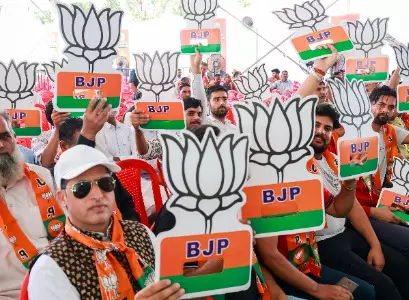BJP wins 91 of 122 seats uncontested in Dadra, Daman local polls; Cong moves Bombay HC

New Delhi: In a partial relief to WhatsApp, the National Company Law Appellate Tribunal (NCLAT) on Tuesday overturned a section of the Competition Commission of India’s (CCI) order that had barred the instant messaging platform from sharing user data with its parent company Meta Platforms for advertising purposes for five years. However, the appellate tribunal upheld the Rs 213.14-crore penalty imposed on Meta for anti-competitive conduct related to WhatsApp’s 2021 privacy policy update.
The two-member NCLAT bench, comprising Chairperson Justice Ashok Bhushan and Member Arun Baroka, modified the CCI’s November 18, 2024, order. It specifically set aside paragraph 247.1 of the 158-page CCI order, which had prohibited WhatsApp from sharing user data with Meta companies for advertising. “The directions issued by the CCI to cease and desist in paragraph 247.1... are not sustainable and are set aside,” the tribunal said. “The rest of the impugned order is upheld,” it added.
While offering relief on the data-sharing restriction, the tribunal maintained that WhatsApp’s 2021 privacy policy constituted an abuse of its dominant position in violation of Sections 4(2)(a)(i) and 4(2)(c) of the Competition Act, as it imposed unfair conditions on users and created a situation of market denial. “We find that mandatory acceptance of broad and vague data sharing terms amounted to coercion and unfair condition on users,” the order stated. It added that the “take it or leave it” nature of the policy forced users to consent to extensive data sharing without a meaningful opt-out option.
According to the NCLAT, WhatsApp’s dominance in India’s over-the-top (OTT) messaging market allowed it to enforce these terms, while Meta’s access to shared data gave it a significant edge in online display advertising. “Cross-platform data sharing between WhatsApp and Meta enhanced Meta’s advantage in the display advertising market, creating an entry barrier for rival firms,” the tribunal observed in its 184-page judgment.
The bench noted that Meta, though not dominant in the online display advertising market, had created a “situation of market denial” through its conduct. “It needs to be noted that Section 4(2)(c) gets attracted herein due to special circumstances existing in this case,” the tribunal said.
However, NCLAT disagreed with the CCI’s conclusion that Meta had violated Section 4(2)(e) of the Competition Act, which prohibits leveraging dominance in one market to gain advantage in another. The tribunal held that the provision was not applicable since WhatsApp and Meta are distinct legal entities. “The order holding breach of Section 4(2)(e) is not sustainable as it cannot be concluded that Meta has leveraged its dominance in one market to protect or extend dominance in another,” the bench said.
Despite acknowledging that Meta is not dominant in the Indian online advertising market, the tribunal upheld the Rs 213.14-crore penalty, stating that it found “no infirmity” in the CCI’s methodology for calculating the fine. “We therefore do not find justification in ordering review of the penalty,” the order stated.
The NCLAT also noted the close corporate and operational relationship between WhatsApp and Meta, observing that “WhatsApp does not have standalone financial statements” and that both companies share common executives. It said that the CCI had established “excessive data sharing” between the two platforms, which justified imposing the penalty in a combined manner.
“We have determined earlier that it is WhatsApp alone which is dominant in the relevant market of OTT messaging apps through smartphones in India and is also found to have abused its dominant position and violated Section 4(2)(a)(i) of the Act. Thus, imposition of a penalty on WhatsApp is wholly justified,” the tribunal added.
In response to the judgment, a Meta spokesperson said, “We welcome the NCLAT’s decision. While we await the written order, we continue to reiterate that WhatsApp’s 2021 privacy policy update did not change the privacy of people’s personal messages, which remain end-to-end encrypted. WhatsApp’s optional business features make people’s lives more convenient with services like bill payments, ticket booking, and shopping – while supporting local businesses and furthering India’s digital economy.”
The CCI had originally imposed the Rs 213.14-crore fine on Meta in November 2024 for unfair business practices linked to the 2021 WhatsApp privacy policy update. Both Meta and WhatsApp challenged the decision before the NCLAT, which in January 2025 temporarily stayed the five-year ban on data sharing between the two companies pending the final verdict. After hearings concluded in September, the appellate tribunal delivered its ruling on Tuesday.



